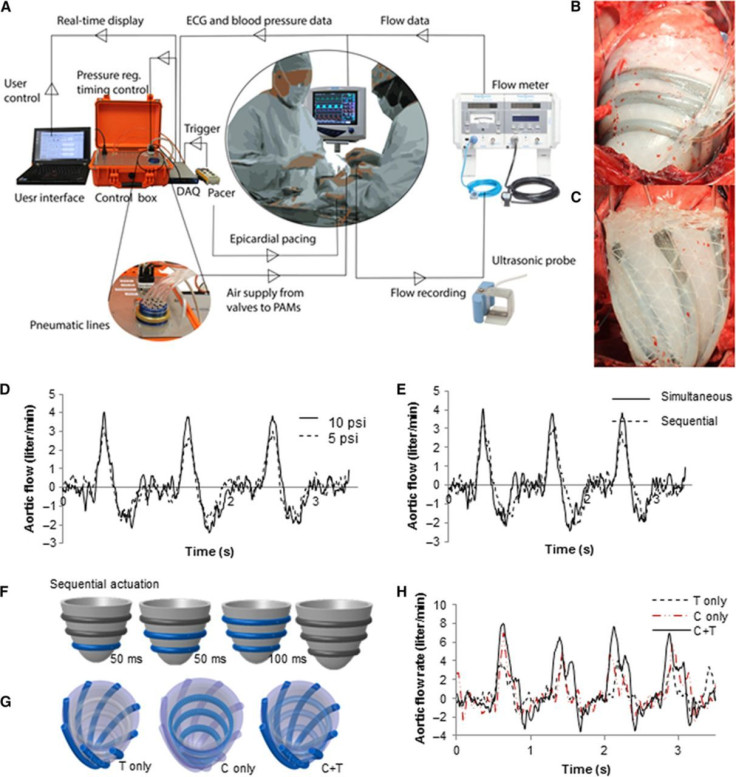Heart Failure Robot Treatment Breakthrough: 'Hug Machine' May Restore Normal Blood Circulation After Cardiac Arrest

Living with heart failure can require us to make changes in our lives, take it slower, and get support. Despite treatment, long periods of stability can be shaken by random flare-ups, pushing symptoms out of control. Now, researchers from Harvard University and Boston Children's Hospital have devised a robot "hug machine" that can potentially save heart failure patients from death.
"Soft robotic devices are ideally suited to interact with soft tissue and give assistance that can help with augmentation of function, and potentially even healing and recovery," said Dr. Ellen Roche, the paper’s first author, of National University of Ireland Galway, and former Ph.D student at Harvard, in a statement.
Read More: How To Recognize Symptoms Of Cardiac Arrest, Angina, Stroke, And Heart Failure
Currently, ventricular assist devices (VADs), which include a mechanical pump, are used to treat heart failure. Typically, they're implanted in the belly or worn outside it, and connected to the heart via several tubes. They function by pumping blood from the ventricles — each of the two main heart chambers — into the aorta, which is the main artery of the body. Since VADs come in direct contact with blood, they can cause a blood clot, which can trigger potentially lethal or debilitating strokes. Patients with VADs must take blood-thinning anticoagulant drugs, which can lead to bleeding problems, according to the Mayo Clinic.
The robotic device fits the heart like a glove, and never comes in contact with the blood, which reduces the severity of complications. It's made of elastic silicone that acts as a natural heart muscle. Surgeons used a suction device, sutures, and a gel to help with any friction. The thin silicone sleeve is comprised of air-pressured actuators, which are placed around the heart to act as its outer muscle layers, so it can twist and compress similar to a beating heart. The device is tethered to an external pump, which uses air to power the soft actuators.
"The sleeve can be customized for each patient," said Roche.
Therefore, if a patient has more weakness on the left side of the heart, the actuators can be tuned to give more assistance on that side. The pressure of the actuators can also increase or decrease over time, as the condition evolves.
In the study, published in Science Translational Medicine, researchers tested the efficacy of the device on six pigs under drug-induced cardiac arrest. They found the soft robot helped boost the amount of blood being pumped around the body. When the heart stopped beating, the sleeves restored blood flow.
"This research is really significant at the moment because more and more people are ending up with heart failure," said Roche.


Read More: Depression Can Increase Your Chances Of Heart Failure by 41%
The research is still at an early stage, and there will need to be longer-term animal studies, and then human studies, before this is used on patients. But, this could provide a sigh of relief for the 5.7 million adults in the U.S. with heart failure, according to the Centers for Disease Control and Prevention.
In 2016, two new drugs, Amgen’s Corlanor and Novartis’ Entresto, were added to the heart failure treatment guidelines by the American College of Cardiology, American Heart Association, and Heart Failure Society of America. Amgen’s Corlanor and Novartis’ Entresto are both twice-a-day pills that cost roughly $4,500 a year, with Medicare and most private insurers covering the drugs. They work differently, as Corlanor slows the heart rate, while Entresto works to relax blood vessels, allowing better blood flow, and decreases counterproductive stress on the heart.
There are people living with end-stage heart failure, with some requiring a heart transplant. There's not enough hearts to meet the needs of those wait listed, but a device like the soft robot could buy some patients more time, and provide a higher quality of life.
Source: Roche ET, Horvath MA, Wamala I et al. Soft robotic sleeve supports heart function. Science Translational Medicine. 2017.
See Also:
Painkillers Linked To Heart Failure
Coffee May Not Be Dangerous For People With Recent Heart Failure
Published by Medicaldaily.com



























